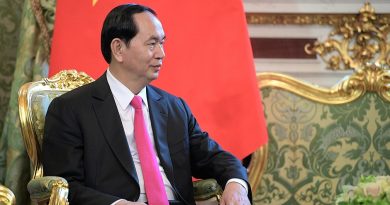The US and Vietnam Strengthen Ties with New Partnership
Ryan Campbell
Staff Writer
In the wake of mounting concerns over China, United States President, Joe Biden, and the General Secretary of the Communist Party in Vietnam, Nguyen Phu Trong, solidified a new “Comprehensive Strategic Relationship” in Hanoi on September 10. This move not only furthers the United States’ goals of strengthening ties in the Indo-Pacific region but also aligns with Vietnam’s economic and security ambitions. Though neither party directly cited China in the joint statement released on the matter by The White House, the decision to reinforce their relationship directly relates to the growing influence of China on a global scale.
In line with the Indo-Pacific Strategy document out of The White House, the Biden Administration has been dedicated to shoring up relationships in the Indo-Pacific region, and the decision to reaffirm relations with Vietnam seems to be an extension of this goal. The U.S. has partnered with allies in the region to maintain stability while China “actively [seeks] to overturn the international rules-based order that has kept peace in the [Indo-Pacific],” according to the Department of Defense. As the network of allies to the U.S. expands, Reuters reports that partnering with Vietnam, a country closely related to China both physically and economically, would be a key piece in the strategy to contain Beijing, something officials in Washington are keenly aware of. The statement made on September 10 reflects two years of the Biden Administration’s continuous efforts to win over Vietnam. “It reflects the leading role that Vietnam will play in our growing network of partnerships in the Indo-Pacific as we look to the future,” says Jake Sullivan, National Security Advisor, in a press briefing by The White House.
But the decision to strengthen ties to Vietnam is for more than just security reasons. Vietnam is an attractive destination for U.S. tech companies, with supplies of rare earth elements and a young, educated workforce, and it is a promising market for the weapons industry, says Reuters. Additionally, Vietnam is poised to become a part of the semiconductor supply chain. Since President Biden has restricted U.S. investments in and exports to China, further developing the electronics and tech sector in Vietnam could be integral to U.S. success in these industries.
And for Vietnam, the U.S. offers an appealing alternative to Chinese partnership. The U.S. has agreed to support Vietnam in training a “high-tech workforce” and is pouring money into boosting Vietnamese tech sectors and entrepreneurs, as detailed by the White House and Vietnam’s joint statement. As Vietnam aims to become a high-income country in the next 20 years, as detailed by the World Bank, investing in global in-demand assets over the stalling economy of Beijing is simply more practical. Secretary Nguyen Phu Trong detailed in a statement to Vietnam’s state media by their Ministry of National Defense how these economic cooperations were a driving force for bilateral relations.
Vietnam could also be sending a warning to Beijing with its new ties to the U.S. as China continues to encroach on Vietnam’s claims in the South China Sea. As detailed by the Harvard International Review, China has contested Vietnam’s claims in the South China Sea leading to age-old conflicts that still last today as agression from China is only becoming more common. Vietnamese Ministry of Defense reports that just a few weeks ago, Chinese warships attacked Vietnamese fishermen while in Vietnamese waters, and Voice of America has cataloged almost 100 of the same incidents happening since 2014. Decreasing reliance on China would give Vietnam a greater capacity to push back on this type of aggression. Secretary Nguyen Phu Trong seems to have highlighted the warning to China by stating, “Vietnam values the U.S.’s affirmation to support a strong, independent, self-reliant, and prosperous Vietnam.”
U.S. Human Rights organizations have also raised concerns about the new ties between the U.S. and Vietnam, reports the New York Times. Vietnam remains an authoritarian and communist country, recently cracking down on activism promoting democracy. The president hesitated to answer questions on this particular issue, avoiding them by accentuating a “noninterference in each other’s domestic affairs.”
The new connection between the U.S. and Vietnam undeniably sends a message to Southeast Asia, building a more stable economic platform for the two countries and projecting unity in the face of increasing aggression in the region. Whether this new partnership ends as a rhetorical deterrent or a cause for a new economic boom is yet to be seen.

